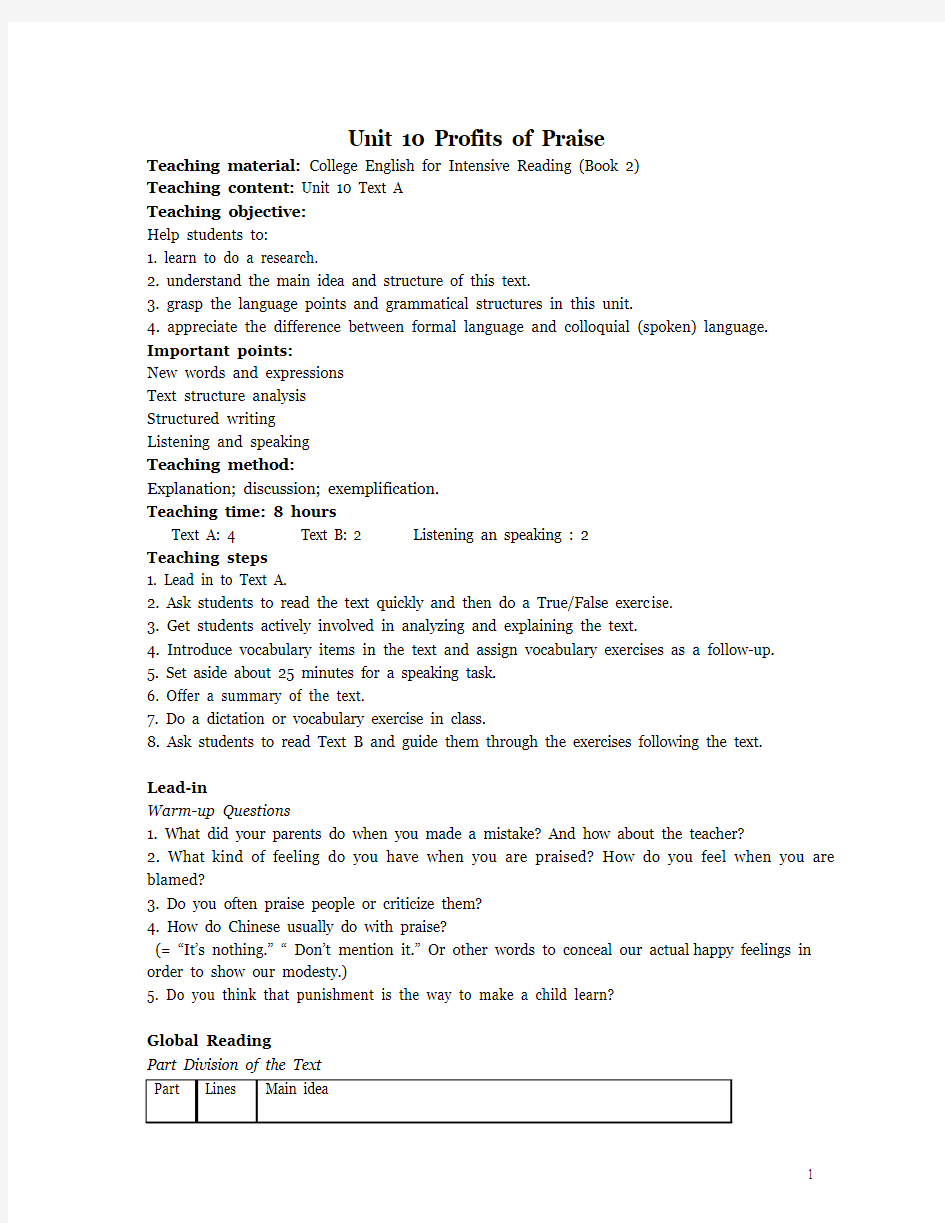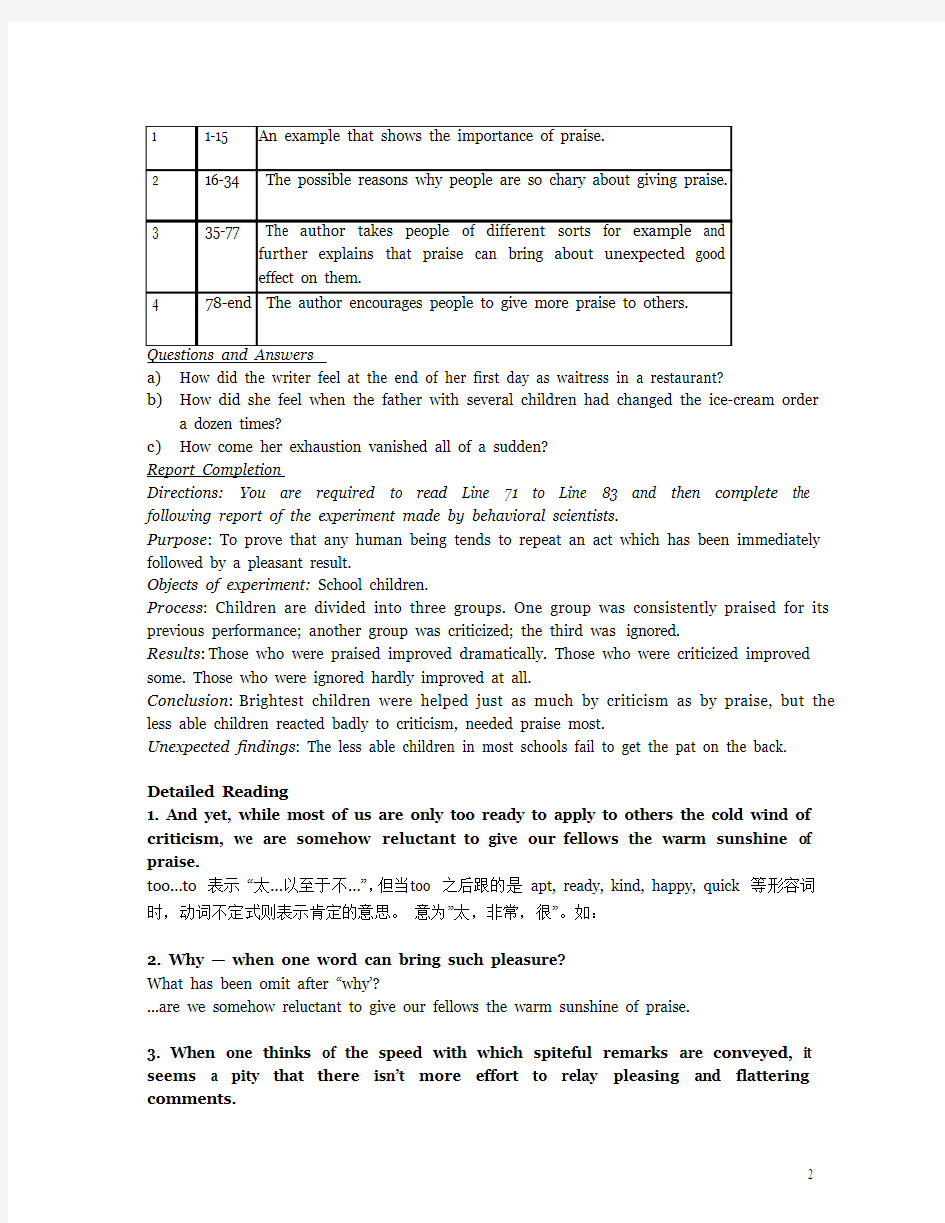Unit 10 Profits of Praise Teaching plan大学英语二


Unit 10 Profits of Praise
Teaching material: College English for Intensive Reading (Book 2)
Teaching content: Unit 10 Text A
Teaching objective:
Help students to:
1. learn to do a research.
2. understand the main idea and structure of this text.
3. grasp the language points and grammatical structures in this unit.
4. appreciate the difference between formal language and colloquial (spoken) language. Important points:
New words and expressions
Text structure analysis
Structured writing
Listening and speaking
Teaching method:
Explanation; discussion; exemplification.
Teaching time: 8 hours
Text A: 4 Text B: 2 Listening an speaking : 2
Teaching steps
1. Lead in to Text A.
2. Ask students to read the text quickly and then do a True/False exerc ise.
3. Get students actively involved in analyzing and explaining the text.
4. Introduce vocabulary items in the text and assign vocabulary exercises as a follow-up.
5. Set aside about 25 minutes for a speaking task.
6. Offer a summary of the text.
7. Do a dictation or vocabulary exercise in class.
8. Ask students to read Text B and guide them through the exercises following the text.
Lead-in
Warm-up Questions
1. What did your parents do when you made a mistake? And how about the teacher?
2. What kind of feeling do you have when you are praised? How do you feel when you are blamed?
3. Do you often praise people or criticize them?
4. How do Chinese usually do with praise?
(= “It’s nothing.” “ Don’t mention it.” Or other words to conceal our actual happy feelings in order to show our modesty.)
5. Do you think that punishment is the way to make a child learn?
Global Reading
Part Division of the Text
Questions and Answers
a)How did the writer feel at the end of her first day as waitress in a restaurant?
b)How did she feel when the father with several children had changed the ice-cream order
a dozen times?
c)How come her exhaustion vanished all of a sudden?
Report Completion
Directions: You are required to read Line 71 to Line 83 and then complete the following report of the experiment made by behavioral scientists.
Purpose: To prove that any human being tends to repeat an act which has been immediately followed by a pleasant result.
Objects of experiment: School children.
Process: Children are divided into three groups. One group was consistently praised for its previous performance; another group was criticized; the third was ignored.
Results:Those who were praised improved dramatically. Those who were criticized improved some. Those who were ignored hardly improved at all.
Conclusion:Brightest children were helped just as much by criticism as by praise, but the less able children reacted badly to criticism, needed praise most.
Unexpected findings: The less able children in most schools fail to get the pat on the back.
Detailed Reading
1. And yet, while most of us are only too ready to apply to others the cold wind of criticism, we are somehow reluctant to give our fellows the warm sunshine of praise.
too…to 表示“太…以至于不…”,但当too 之后跟的是apt, ready, kind, happy, quick 等形容词时,动词不定式则表示肯定的意思。意为”太,非常,很”。如:
2. Why — when one word can bring such pleasure?
What has been omit after “why’?
...are we somehow reluctant to give our fellows the warm sunshine of praise.
3. When one thinks of the speed with which spiteful remarks are conveyed, it seems a pity that there isn’t more effort to relay pleasing and flattering comments.
1) Paraphrase this sentence.
When one thinks how fast the bad words spread, it seems a pity that on e doesn’t do his / her best to pass good words and bring pleasure to people.
当想到那些冷言恶语传播的速度之快时,我们会为没有尽力传达那些令人愉快的赞美之词而感到遗憾。
4. It’s especially rewarding to give praise in areas in which effort generally goes unnoticed or unmentioned.
1) Where is the real subject of the sentence?
“to give praise in areas in which effort generally goes unnoticed or unmentioned”是句子的真正主语。在英语中,当主语是个较长的句子时,放在句首显得头重脚轻,因此常用形式主语“it” 代替主语从句,而从句则放到表语之后,其结构如下:
It + 系动词+ 形容词/名词+ wh / how / that 从句.
“in which effort generally goes unnoticed and unmentioned”: 是先行词area 的定语从句。unnoticed 和unmentioned在句中是主语补足语。
5. Since so often praise is the only wage a housewife receives, surely she of all people should get her measure.
1) How do you understand “of all” in this sentence?
of all 一般用来表示强调,通常用于两种场合。一种是表示“特别是,尤其是”,另外一种用来表示惊讶,意为”竟然是,偏偏是。”
How can he be absent today, of all days?
他为什么偏偏在今天迟到?
2) Find a word with similar meaning to “measure”.
share
6. One teacher writes that instead of drowning students’ compositions in critical red ink,
What is the author’s implied meaning in this sentence?
Teachers shouldn’t always write scolding words on the students’ compositions in red ink.
Writing Practice
Directions: Write a paragraph of about 100 words arguing that praise is more profitable than criticism. You can support your arguments with examples from the text or from yo ur own experience.
Most people would agree that children learn best when they are praised by teachers or parents. Teachers can see the value of praise every day in their classrooms. Students who receive praise instead of “red marks” on their writing papers seem to improve more rapidly in writing skills. Similarly grown-ups do a better job if they get a pat on the back. Yet, people who do routine jobs such as waiting on tables or keeping house seldom receive compliments. Small wonder they consider their work a dreary grind. So it is especially rewarding to give these people praise. For instance, a kind smile and a few warm words removed all the
tiredness of the author when at the end of her first day as waitress she was exhausted and ready to quit. So if we can keep an eye on the small excellences around us and give compliments to those who deserve them, we can bring joy into the lives of other people as well as our own.
Proverbs and Quotations
1. The secret of success is constancy of purpose.
2. He who laughs best who laughs last.
3. To a wise man one word is enough.
4. We ask advice, but we can receive approbation.
— Charles C. Colton; British clergyman 我们征求意见,但事实上我们是想得到赞许。
——英国牧师科尔顿, C. C.
5. When anyone remains modest, not after praise but after blame, then his
modesty is real.
— John Paul Richter; French writer 当一个人没有获得赞扬而是遭到批评之后仍然保持谦虚,他的谦虚才是真实的。
——法国作家赖奇特, J. P. Exercise and homework
